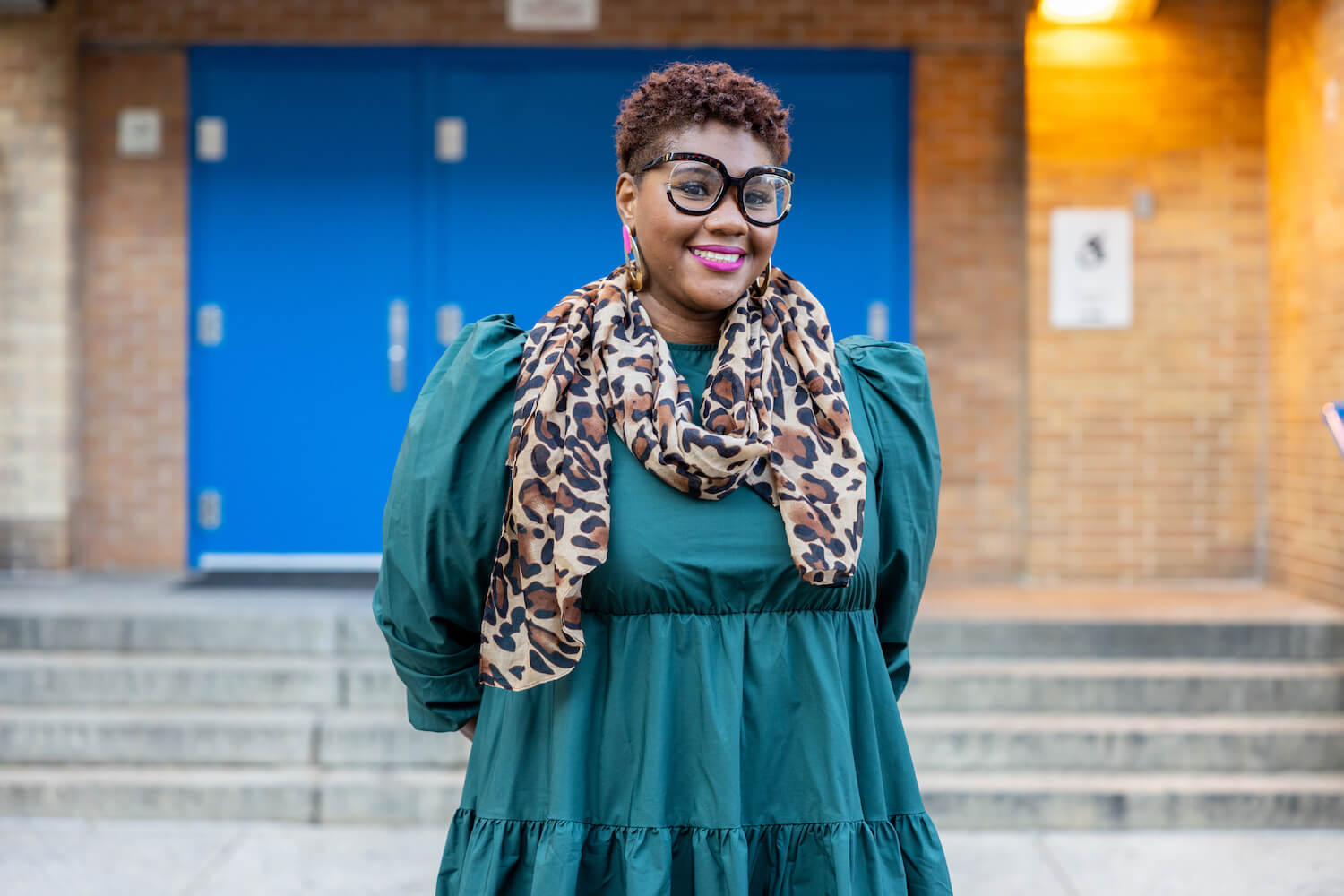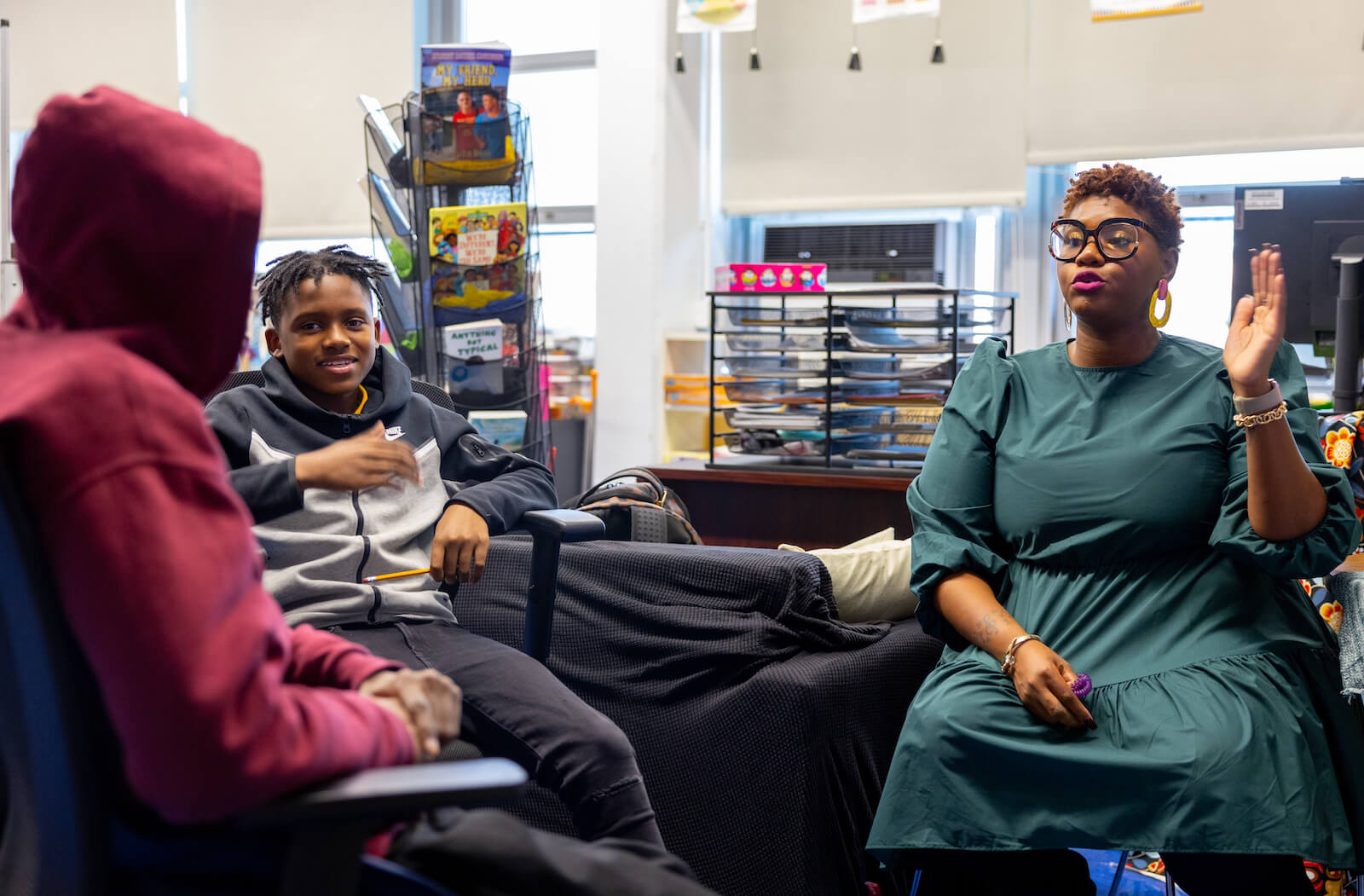I Want My Students to View Me as Their Cheerleader
Speech Language Pathologist and Touro Alumna Shatima Howard Gives Autistic Students the Help They Need

At the Madiba Prep Middle School of Social Justice and Innovation, students know they have something special with speech language pathologist and Touro University alumna Shatima Howard, M.S., CCC-SLP, TSSLD.
“I want my students to view me as their cheerleader, their empowerment, their safe haven,” stated Howard. “I want my students to know that I have their back. If no one else has their back, they're going to know Ms. Howard has their back.”
Providing her students with the support they need is something that Howard ties back to her experience at Touro University: first as a student in New York School of Career and Applied Studies (NYSCAS) and then in Touro’s School of Health Sciences (SHS) Speech-Language Pathology (SLP) program.
“I felt like I mattered,” recalled Howard about her time in the university. “As an educator now, I look at my students and feel that some need special support and some will be fine on their own. Touro sees these things in their students, and they give them what they need.”
A College Diploma to Take Care of Her Son
Shortly after she gave birth to her son, Howard’s partner died, leaving her a single mother. While living with her parents and working at Pathmark, she saw a sign for NYSCAS.
“I said to myself, ‘Okay, let me just go see what it's about,’” remembered Howard. “And honestly, that's exactly how it happened. All I wanted to do was to go in and just see what it was, but once I was there, I spoke to admissions, and they told me that I was in. I just had to go back and bring my diplomas and transcripts. I had no idea what I wanted to do, but I knew that somewhere along the line I would need a college diploma to take care of my son.”
How she was treated at Touro left an impact on her.
“As a single mom, Touro made it amazingly easy for me to go to school,” Howard said. “We had night classes and professors gave extensions when we needed extra time. They were firm but understanding. The attitude was: ‘So I'm going to give you what you need, but you must be accountable. You must hold up your end of the bargain.’”
The Path to Speech Pathology
Reinvigorated by her new status as a college student, Howard began working as a para-educator in School District 75, where she found that many of the other para educators were also NYSCAS students. It was in District 75 where Howard first discovered the speech pathology profession.
“There were a number of female Black speech language pathologists, which is something that you really don't see,” explained Howard.” And it was maybe about three or four in a school, which is a lot. We, as Black Americans, really don’t know the variety of career opportunities there are. I didn’t even know what a speech pathologist was. I saw Black teachers, Black social workers, and even Black occupational therapists, but speech pathologist was something totally new.”
In addition to seeing how important black representation was in the profession, Howard also saw the power that good speech pathologists can have in the lives of their students.
“Many of my students were nonverbal and had cognitive delays and challenges,” Howard said. “I noticed that the speech pathologists were able to really focus in and zone in on the students and their needs. Students began school unable to speak and we watched them learn one-to-two-word phrases and utterances. It was amazing. I felt like, ‘Wow, we're giving them a voice.’ To have a parent say, ‘Hey, he said mom for the first time,’ or ‘Hey, he asked me for candy or chips,’ that made me feel like we made a difference.”
In 2018, Howard continued her journey in Touro University by enrolling in Touro’s School of Health Sciences (SHS) Speech-Language Pathology (SLP) program.
Helping Children Leave the Nest
As part of her application to the graduate school, Howard made several visits to SHS SLP’s clinic. She was surprised that the faculty recognized her when she came back as a student. “They knew me already,” said Howard. “They recognized my face and knew who I was. That felt special. How many people come into a clinic? 300? For them to take the time out to remember me and welcome me when I came to the school meant something.”
For her own clinicals, Howard requested to be placed in the Autism Spectrum Disorders (ASD) Nest program. The program places students with autism within the general education population.
“I'm working now, in a Nest program, which not many people get a chance to be a part of that. To experience what it's like in a Nest program as a grad student, and then to come out and graduate and be placed in a middle school who has a Nest program is amazing. Touro got me to this point. If I wouldn't have requested it and they made it happen, I wouldn't have been able to be here.”

After earning her degree, Howard began working in the Nest program at the Madiba School, whose values she shares.
“We focus on community service, accountability, respect, resiliency and leadership,” said Howard. “These are the pillars the school is built on. Our school’s namesake is Nelson Mandela, Madiba, and we teach our students how to be a leader like him: how to tap into their strengths as well as their weaknesses. Why weaknesses? Because once you know your weaknesses you know what you need to be working on.”
“At Madiba Prep we have a village-like mentality. Each teacher works with other teachers so we’re all working and connected with each of the students. We’re in the heart of Bed-Sty and our students are predominantly Black Americans, with a large percentage of Hispanic and a Middle Eastern population as well. All of our students come from low socioeconomic places, and it impacts them dramatically to be able to sit in a school like ours and feel accepted. We still face challenges, even when our students feel accepted, they see failure all around. Our work is so important for our students because it’s really hard for them to see they can succeed if they see so much failure around them.
Every Child is Different
One of Howard’s favorite maxims is if ‘You know one autistic child, you know one autistic child.’ And she advocates for all her students.
"Every autistic child is not the same,” maintained Howard. “All children on the spectrum do not benefit from fidgets. All of them may not benefit from movement breaks. I want the world to know that you cannot put them in a box because everyone who's autistic has sensory issues or everyone who's autistic has meltdowns. I need us to come away from those thoughts and look at a person with autism and learn who they are and help them to be their authentic selves. Help them to socialize and integrate into the world and into the community with their strengths. Try not to look at what they can't do or what we think they can't do.”
And the first step to helping a child find his strength is giving them a voice.
“I'm helping them to tap into their social strengths,” said Howard. “I'm helping them to recognize their social challenges. My job is to help them recognize their role in peer interactions. How are they a leader in the classroom? How can they help their peers be successful? How can they participate in group interactions and just give the group what's missing. Everyone has a role in peer interactions. What is their role? My role is to help them tap into what they are good at or tap into their own strengths and interest and bring it into the world.”
50 Years More
Asked about Touro University’s recent 50th celebrations, Howard said she is excited to watch the university grow.
“That’s 50 years of rolling out professionals and 50 years of impacting the world,” she concluded. “That’s 50 years of helping families and 50 years of building legacies. It’s a huge accomplishment. For me, I am building a legacy for my son. If Touro wasn't there and I hadn't been in Touro, where would I be for my 14-year-old son? Touro’s 50th is big and beautiful. There's going to be 50 more years and more and more years. There's going to be way more people to come out and talk about how great their programs were, how strong it made them feel, and how they were able to make something for their families.”

